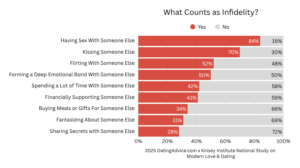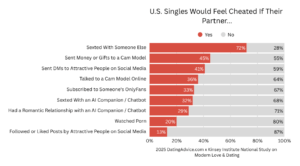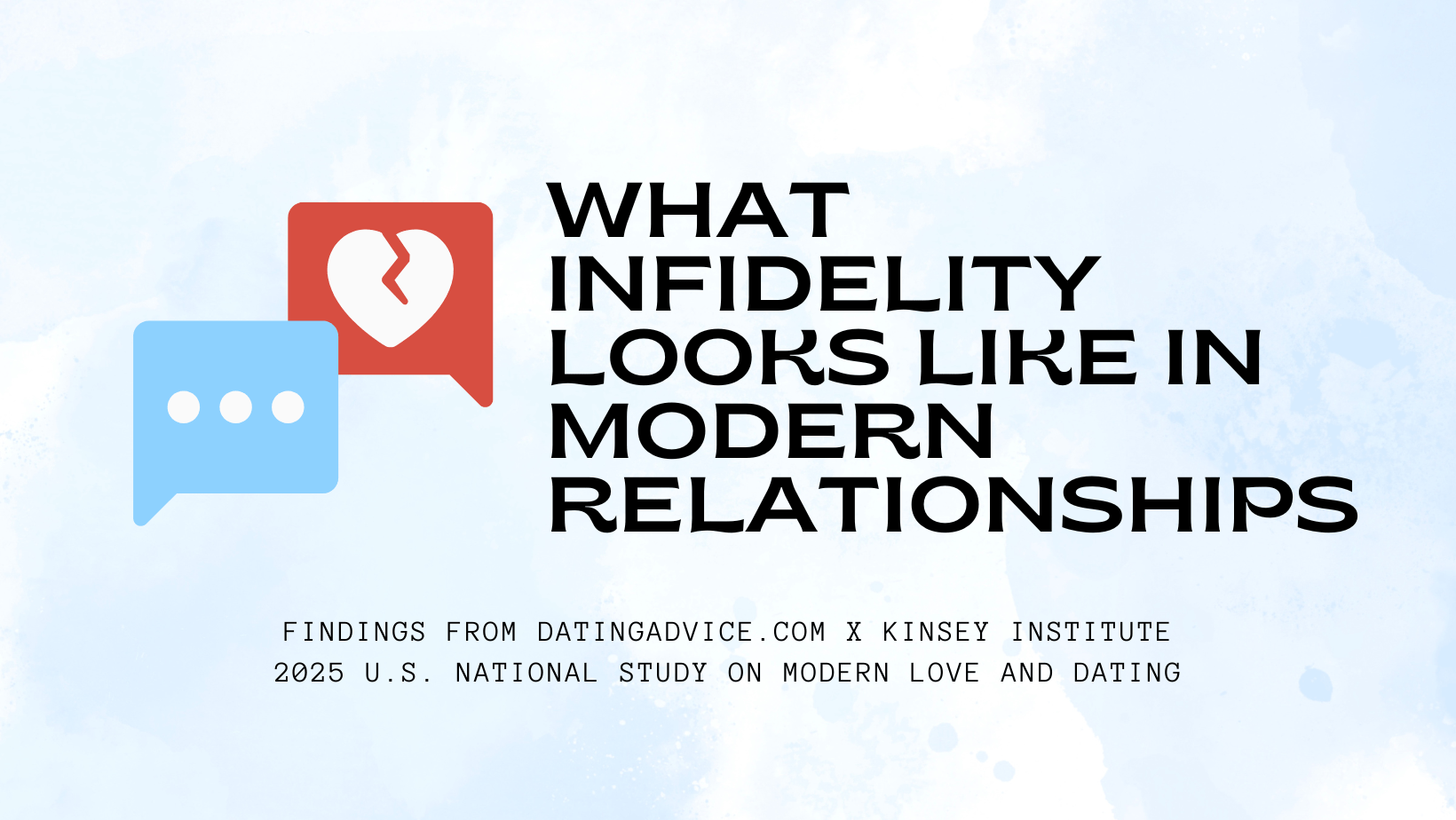What Infidelity Looks Like In Modern Relationships
August 6, 2025 by Emily Mendelson
There’s an ongoing debate over what actually counts as cheating. For example, is flirting with someone else a form of infidelity? What about following someone you find attractive on social media? Or how about sharing your deepest secrets with another person? Some of these questions might be easier for you to answer than others, but there’s a lot of disagreement over them because different people define cheating in different ways.
Broadly speaking, infidelity can be thought of as any behavior that violates a commitment or boundary in a romantic relationship. While that might sound simple enough, it quickly becomes complicated because people often don’t communicate with their partners about how they define infidelity. Many people simply assume that their partner holds the same definition as they do.
Dating Advice x Kinsey Institute Study
In this post, we’re going to look at findings from The State of the US: National Study of Modern Love and Dating, a new study conducted by the Kinsey Institute and DatingAdvice.com, which offers fresh insights into how people today view cheating and infidelity.
The study, led by Drs. Justin Lehmiller and Amanda Gesselman, featured a demographically representative sample of 2,000 American singles ranging in age from 18 to 91. Participants were asked how they conceptualize infidelity, what they have done in the past when suspecting a partner of infidelity, and whether they themselves have ever cheated.
What Counts as Infidelity?
Participants were asked about a number of different behaviors and whether or not they constituted infidelity. The graph below summarizes these results.

As you can see, there wasn’t 100% agreement on anything; however, there was pretty strong consensus that certain things constituted infidelity. For example, 84% indicated that having sex with someone else counts as infidelity, while 70% said the same of kissing another person.
Outside the realm of physical behaviors, things get murkier. Participants were almost evenly split over whether flirting with someone else or forming a deep emotional bond with someone else counts as cheating. In addition, about one-third of participants thought that buying gifts/meals for another person, fantasizing about someone else, or sharing secrets represented infidelity.
The Role of Technology in Infidelity
Technology has reshaped the modern dating landscape in many ways, including in terms of how we think about cheating. In this survey, participants were also asked whether a number of different technologically-mediated behaviors would be perceived as cheating if their partner engaged in them.

There was pretty widespread agreement that sexting another person is a form of cheating; however, opinions were split over the remaining behaviors. For instance, nearly half (45%) of participants indicated that they would consider a partner sending money or gifts to a cam model as cheating, one-third indicated that they would consider sexting with an AI companion or chatbot as cheating, and one-fifth said that simply watching porn would represent infidelity.
According to Kinsey Institute Research Scientist Dr. Amanda Gesselman:
“These results challenge the way we’ve been thinking about digital behaviors. For example, interactions with cam models or with OnlyFans creators are often viewed as purely transactional. People simply paying for content, and that kind of exchange has become commonplace in our society. Similarly, the prevailing narrative around AI is that it’s providing us with something ‘sub-human’ or lower quality than what a human could produce—whether that’s in the context of work, school, or romance. However, our results show that modern daters see things differently. They recognize that these technologies can offer real benefits, including intimacy and support. For many, those benefits feel meaningful enough to pose a threat to their relationships.”
Overall, the findings from this study demonstrate that singles today have very mixed opinions when it comes to what actually counts as cheating in relationships. In light of this, it is important for people to start thinking more carefully about what their boundaries are, including their boundaries around emerging technologies, and communicate about them in their relationships. There aren’t necessarily any “right” or “wrong” answers here. What matters most is having the conversation and not simply assuming that your partner thinks about infidelity in the exact same way that you do.
If you have a sex question of your own, record a voicemail at speakpipe.com/sexandpsychology to have it answered on the blog or the podcast.
Want to learn more about Sex and Psychology? Click here for more from the blog or here to listen to the podcast. Follow Sex and Psychology on Facebook, Twitter (@JustinLehmiller), Bluesky, or Reddit to receive updates. You can also follow Dr. Lehmiller on YouTube and Instagram.
Images made with Canva.

Dr. Justin Lehmiller
Founder & Owner of Sex and PsychologyDr. Justin Lehmiller is a social psychologist and Research Fellow at The Kinsey Institute. He runs the Sex and Psychology blog and podcast and is author of the popular book Tell Me What You Want. Dr. Lehmiller is an award-winning educator, and a prolific researcher who has published more than 50 academic works.
Read full bio >


